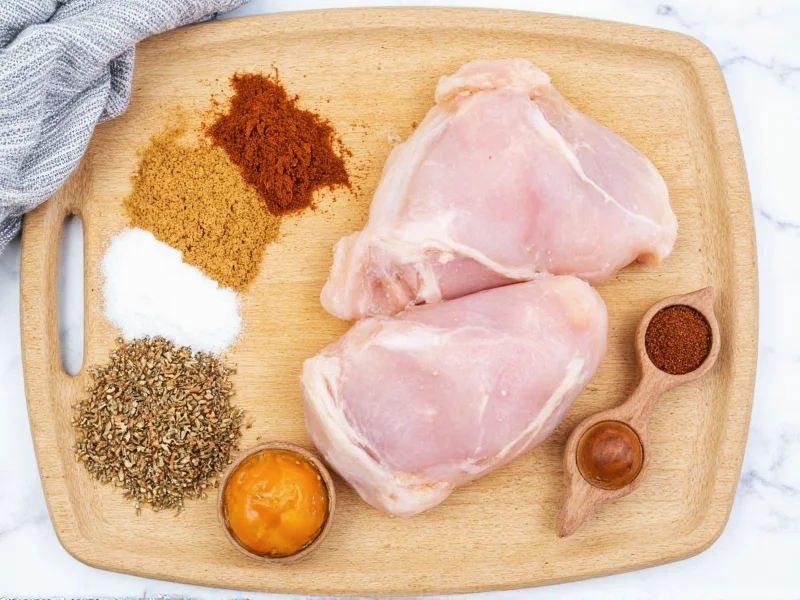The Essential Chicken Fajita Spice Components
Creating authentic chicken fajitas starts with understanding each spice's role in the flavor profile. Chili powder forms the foundation, providing that characteristic Southwestern warmth without overwhelming heat. Cumin adds earthy depth that's essential for authentic Mexican-inspired dishes. Garlic and onion powders deliver savory notes that penetrate the chicken during marinating. Smoked paprika contributes a subtle smokiness that mimics traditional outdoor cooking methods, while Mexican oregano offers a citrusy, less sweet alternative to Mediterranean oregano.
Unlike generic taco seasoning, a proper chicken fajita spice blend maintains balance where no single flavor dominates. The ideal mixture should enhance, not mask, the natural flavor of the chicken. For best results, combine these spices with lime juice, olive oil, and a touch of salt before applying to your chicken. Allow at least 30 minutes of marinating time for flavors to penetrate, though 2 hours yields superior results for homemade chicken fajita seasoning.
Authentic vs. Americanized Spice Profiles
Traditional Mexican fajita spices differ significantly from common American restaurant versions. Authentic preparations rely on freshly toasted and ground spices rather than pre-mixed blends. In central Mexico, you'll find recipes emphasizing achiote (annatto) and hoja santa for regional variations, while Texas-style fajitas typically feature more cumin and chili powder.
When creating your authentic chicken fajita seasoning recipe, consider these regional differences:
- Northern Mexico: Higher proportion of cumin with addition of dried chiles like guajillo
- Texas border regions: More chili powder with garlic prominence
- Coastal variations: Citrus-forward with less heat and more oregano
Understanding these distinctions helps you customize your spice blend based on whether you're aiming for street-food authenticity or familiar restaurant-style flavors.
Precise Spice Measurements for Perfect Results
Getting the chicken fajita seasoning ratio correct is crucial. Too much cumin overwhelms, while insufficient chili powder leaves the dish bland. The following table provides exact measurements for various serving sizes:
| Chicken Quantity | Chili Powder | Cumin | Garlic Powder | Onion Powder | Smoked Paprika | Mexican Oregano |
|---|---|---|---|---|---|---|
| 1 lb (450g) | 2 tbsp | 1 tbsp | 1½ tsp | 1½ tsp | 1 tsp | ½ tsp |
| 2 lbs (900g) | 4 tbsp | 2 tbsp | 3 tsp | 3 tsp | 2 tsp | 1 tsp |
| 3 lbs (1.35kg) | 6 tbsp | 3 tbsp | 4½ tsp | 4½ tsp | 3 tsp | 1½ tsp |
For how much cumin for chicken fajitas, remember that while cumin is essential, exceeding 1 tablespoon per pound of chicken creates an overpowering earthiness that dominates other flavors. The sweet spot is that 1:2 ratio between cumin and chili powder.
Fresh vs. Dried Spices: Maximizing Flavor
While dried spices form the backbone of your chicken fajita spice mix, incorporating fresh elements elevates your dish. Substitute 1 teaspoon garlic powder with 3 cloves of minced fresh garlic for brighter flavor. Similarly, replace onion powder with 2 tablespoons of finely minced white onion.
For authentic results, toast whole cumin seeds in a dry skillet for 1-2 minutes until fragrant, then grind them yourself. This technique releases essential oils that pre-ground spices lose over time. Freshly squeezed lime juice (2-3 tablespoons per pound of chicken) activates the spices and helps tenderize the meat.
Avoiding Common Spice Mistakes
Many home cooks make these critical errors with fajita spices:
- Adding spices directly to hot oil - This burns delicate compounds, creating bitterness. Always mix spices with oil at room temperature first.
- Using regular oregano - Mexican oregano has citrus notes that Mediterranean varieties lack. If substituting, use half the amount.
- Marinating too long with acidic components - More than 4 hours in lime-based marinades can make chicken mushy.
- Skipping the resting period - Let seasoned chicken sit 15 minutes before cooking to allow spice penetration.
Customizing Your Fajita Spice Experience
Personalize your best spices for chicken fajitas with these adjustments:
- For extra heat: Add ¼ teaspoon cayenne pepper or chipotle powder per pound
- For smokier flavor: Increase smoked paprika to 1½ teaspoons
- For citrus notes: Add 1 teaspoon dried epazote or 1 tablespoon fresh cilantro after cooking
- For depth: Include ¼ teaspoon ground coriander
- For restaurant-style char: Add 1 teaspoon onion powder and cook at very high heat
When adjusting heat levels, remember that capsaicin (the compound that makes chiles hot) binds to fats. Including 1 tablespoon of olive oil in your marinade helps distribute heat evenly rather than creating hot spots.
Storing and Preparing Your Spice Blend
Create a versatile homemade chicken fajita spice mix by combining dry ingredients only (no oil or lime juice) in an airtight container. Properly stored away from light and heat, your blend maintains peak flavor for 3-4 months. For immediate use, add wet ingredients just before application.
For meal prep efficiency, prepare multiple batches of the dry spice mix. Store in small jars with measurements labeled for different chicken quantities. This approach ensures consistent results while minimizing preparation time when you're ready to cook your traditional Mexican fajita spices preparation.











 浙公网安备
33010002000092号
浙公网安备
33010002000092号 浙B2-20120091-4
浙B2-20120091-4